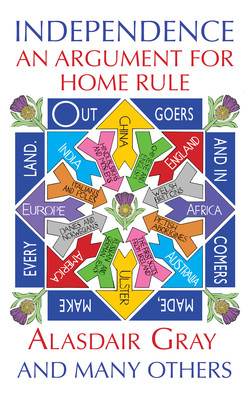Читать книгу Independence - Alasdair Gray - Страница 10
На сайте Литреса книга снята с продажи.
Оглавление2: The Naming of Britain
In three hundred and thirty BC
when ships always tried to sail within sight of land
at the west exit from Earth’s middle sea
don’t go through was carved. That small strait led
to the Atlantic that keeps moving its bed,
drowning beaches twice between noon and noon
and twice uncovering them, pulled by the moon.
It was hard to sail by Atlantic coasts
without splitting keel on reef or running aground
but possible, as traders from Carthage found
who sailed out with bolts of cloth, returned with tin,
carved don’t go through to keep competitors in
and stationed warships to make their command obeyed.
The galley of Pytheas slipped through that blockade.
He was a Greek when Greece had markets
on every Mediterranean shore,
and learned from neighbour-nations more techniques
than discussed in one language before.
Greeks thought all knowledge theirs to explore,
enlarge and record for their extrovert civilization,
a thought that drove Pytheas to Atlantic navigation.
His boat, moved by oars and one square sail
like those in which Vikings cruised to America,
found an archipelago. From a tribe there he took
a name for it used in a Greek geography book,
a name that Romans spelled Britannia,
but during and after the Roman occupation
Britain was never the name of a single nation.
Only Wales could claim the old British name
when Angles, Saxons, Danes and Norman French
conquered south Britain, fighting until they became
one kingdom, England, which they fought to subjugate
every adjacent state. Ireland was the first colony
of her empire over sea. She conquered Wales.
France and Scotland won free.
Scotland was free till King Jamie the Sixth got news
that he could inherit England’s crown too
if he lived there, an offer he did not refuse.
Like many Scots he went down to London town where,
Britain’s chief landlord now, he signed parliamentary acts
to make these islands one kingdom
despite contradictory facts.
England and Scotland’s clergy held
different kinds of Protestant creed –
hating Papists was the one point on which they agreed,
while Catholic Ireland constantly rebelled
against English landlords who bloodily quelled
their attempts to reject the South British yoke.
How could a Scottish king unite such folk?
King James, with the force of English arms,
evicted Catholic owners of Ulster farms,
gave their land to Protestant Scots whose immigration
diluted the Catholic Irish population.
No more (thought James) could they trouble his nation.
Such oversea meddling brought again and again
more and worse centuries of political pain.
To gain an empire whose sun never set
the English explored, traded, fought and won
mastery of seas and vast sub-continents,
helped by Scots and Irish whose parliaments
were both in the past, but left such outsiders a say
in the British Empire, though the USA,
hating taxation by London, soon broke away.
To make folk think the British Isles were one
Britain’s Postmaster General called Scotland N.B. –
North Britain – and Ireland W.B.,
until West British rebels on an Easter day
seized Dublin’s main Post Office, raised a Tricolour flag,
so that England’s first colony followed the USA
when all but six Irish counties broke away.
National empires end. Britain’s did –
Russia’s too. Commercial empires remain
promoting war with drug and weapon sales
while parliaments in Ulster, Scotland and Wales
cannot stop the London government
sending their troops to fight in distant lands
when America’s chief war-businessman commands.
Ulster Protestants may be last to gladly claim
the old British name.
Britain is still the irregular archipelago
to which Pytheas came.
